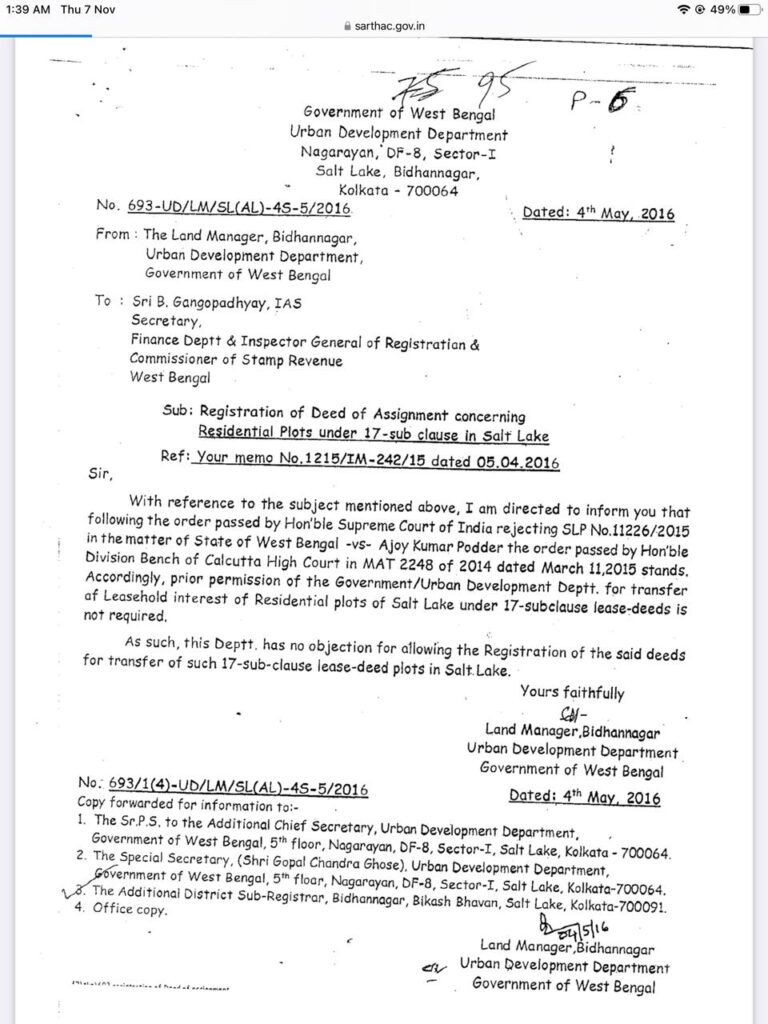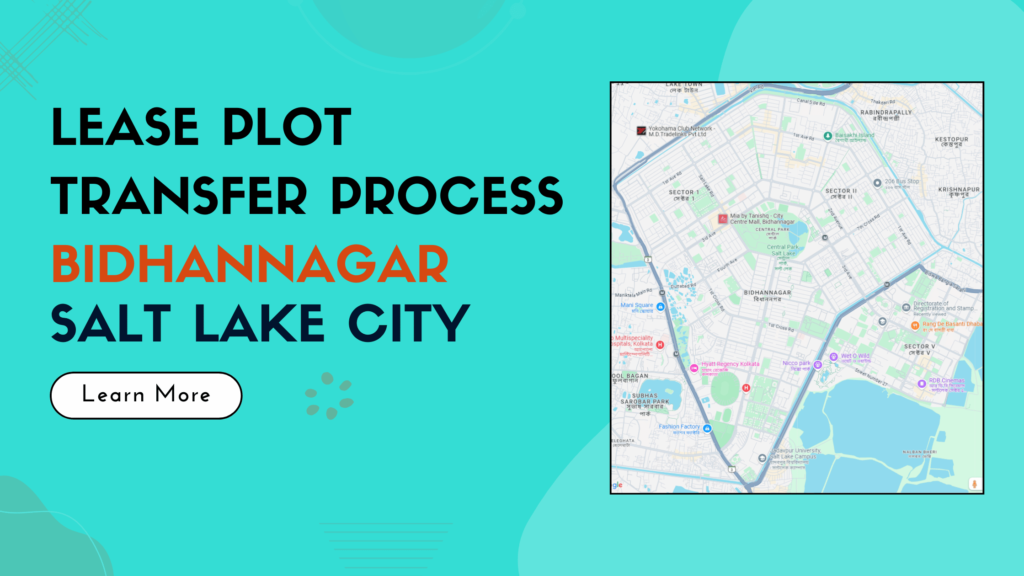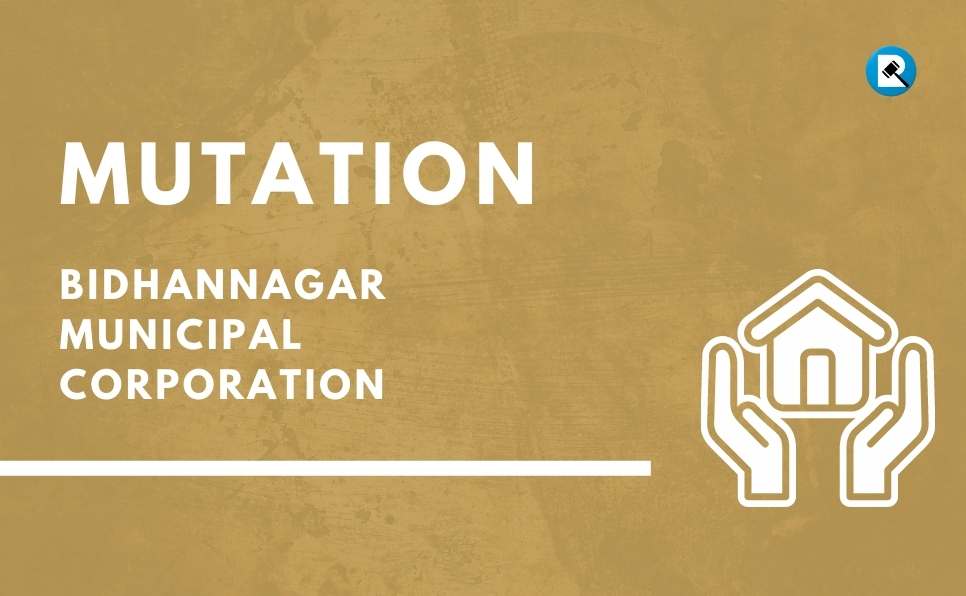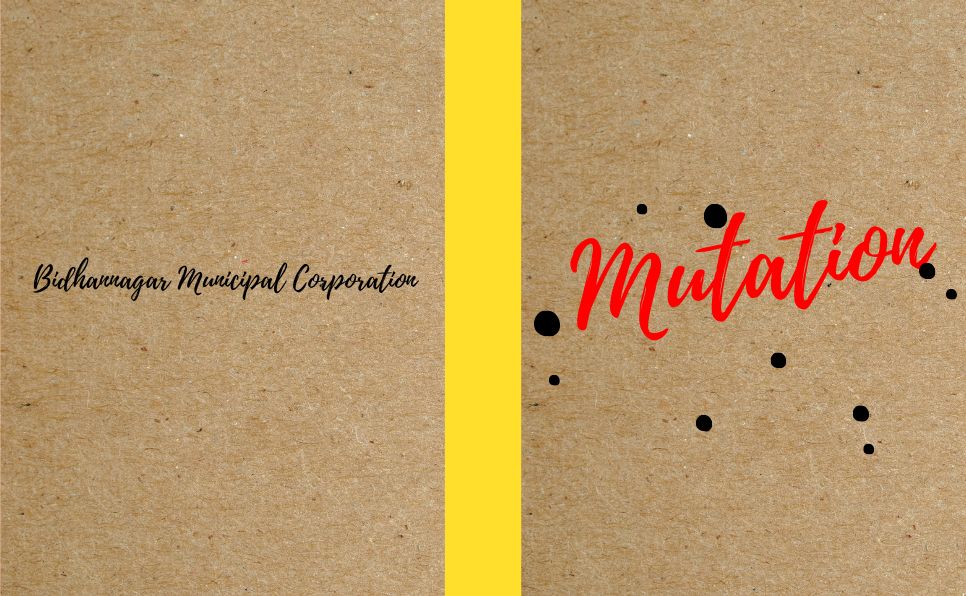Table of Contents
Introduction
The Salt Lake City, currently known as Bidhannagar, was a visionary project initiated by the then Chief Minister of West Bengal, Dr. Bidhan Chandra Roy. His vision was to create a modern and well-planned township near Kolkata. To bring this idea to life, the government acquired wetlands and privately-owned lands situated near what is now known as Bidhannagar. These acquisitions were made from their respective owners, laying the foundation for the development of Salt Lake.
To ensure that ownership of these lands remained under government control, the government adopted a unique approach. Subsequently the acquired lands were distributed and allotted to beneficiaries through long-term lease agreements, spanning an extensive period of 999 years. This arrangement provided individuals with rights to the land while preserving government ownership. At that time the allotments were carried out via a lottery system.
However, over time, challenges arose concerning the transfer of these lands. The lease deeds, being limited to specific terms, imposed restrictions on the transfer or sale of plots in Salt Lake. In the absence of well-defined legal provisions for transferring leased lands, lessees began adapting to alternative way-out. Many plots were unofficially transferred to third parties through instruments such as wills and powers of attorney etc. This practice bypassed formal regulations and resulted in a substantial loss of revenue for the West Bengal Government.
The West Bengal government took decisive action to address these challenges and streamline the process of land transfers. In 2012, a gazette notification was issued, introducing a framework for the transfer of lands in Bidhannagar. The notification contains detailed rules and regulations governing such transactions, aiming to bring clarity and uniformity to the transfer process.
This article seeks to simplify and elaborate on the procedures for transferring land in Bidhannagar, with the aim of providing clear and accessible information to the general public. It is a simple guide for understanding the legalities, steps, and requirements associated with land transfers in this unique township, ensuring transparency and safeguarding government interests.
The 17 Clause Lease Deed
Generally, two types of deeds were registered by the government in favour of the allottees: the 20 Sub Clause Deed and the 17 Sub Clause Deed.
In the case of the 17-Clause Deed, the government did not impose any specific restrictions on the transfer of plots. However, for mutation of plots purchased under a 17-Clause Deed, it is mandatory to follow the procedures stipulated by the government. This absence of restrictions provided lessees with greater flexibility to transfer their interests without seeking governmental consent.
Approximately 88 individuals, among the first residents of Salt Lake in the early 1970s, were allotted plots under the 17-Clause Lease Deed. This approach encouraged settlement in the then newly developed township by offering more liberal terms to initial allottees.
Over time, the transferability of plots under the 17-Clause Lease Deed became a subject of legal scrutiny. In several instances, the Calcutta High Court directed authorities to mutate in favour of transferees without requiring prior government permission, reinforcing the interpretation that such transfers were permissible under the original lease terms.
In 2012, the West Bengal government issued a notification (No. 2709-SL(AL)/4S-9/2004(Pt-I) dated June 22, 2012) imposing a transfer fee of Rs.5,00,000/- (Rupees Five Lakhs) Only, per Cottah for granting permission for land transfers in Salt Lake.
2012 Notification
In 2012, the West Bengal government issued a gazette notification (No. 2709-SL(AL)/4S-9/2004(Pt-I) dated June 22, 2012, to regulate the transfer of leasehold residential plots in Bidhannagar (Salt Lake City), Kolkata. It introduced a framework for a standardized property transfers, enhancing transparency, and generating revenue for the state.
This notification allowed leaseholders of residential plots to transfer their leasehold rights for the remaining term of the lease but made it mandatory to seek prior permission from the Urban Development Department. To facilitate this, the notification imposed a transfer fee of Rs.5,00,000/- (Rupees Five Lakhs) Only, per Cottah, which was required to be paid by the leaseholder for the transfer to be considered valid. However, an exemption from this transfer fee was provided for transfers made to family members, such as parents or spouses.
The notification required the leaseholder to submit an application of transfer to the Urban Development Department, accompanied by all necessary documents. The transfer is subject to rigorous verification by authorities, including the Bidhannagar Municipality and local police.
Additionally, the notification sought to regularize past transfers that had occurred without formal permissions, provided the leaseholder paid the applicable fees. It also emphasized that in all transfers, the original lease terms, conditions, obligations and rights would remain binding on the transferee.
Although this notification primarily targeted lease agreements with restrictive clauses, such as the 20 Sub Clause Lease Deeds, it inadvertently created confusion regarding its applicability to non-restrictive agreements like the 17 Sub Clause Lease Deeds.
Case of State of West Bengal & Ors. vs. Sri Ajay Poddar & Anr.
State of West Bengal & Ors. vs. Sri Ajay Poddar &Anr. judgment clarifies the transferability of leasehold residential plots in Salt Lake, Kolkata, under 17-Clause Lease Deeds. The core issue was whether leaseholders could transfer their leasehold rights without prior approval from the West Bengal Urban Development Authority (UDMA) and without paying a Rs.5,00,000/- (Rupees Five Lakhs) Only, per Cottah transfer fee imposed by a 2012 government notification. The lessees argued that since their lease agreements did not impose restrictions on transfers, they should not be required to seek approval or pay the fee. After a lot of disputes, the case reached the Supreme Court, which ruled in favour of the lessees on March 11, 2015.
The Apex Court held that the 17-Clause Lease Deeds did not include restrictive clauses mandating prior approval for transfers, granting leaseholders the freedom to transfer their interests without such permissions. It further determined that the 2012 notification, which introduced the transfer fee, was only applicable to lease deeds containing restrictive covenants, such as the 20-Clause Lease Deeds, and not to 17-Clause Deeds.
Additionally, the Apex Court validated transfers executed without prior government approval under these deeds, provided they adhered to other legal and procedural requirements. This judgment clearly outlined that the original terms of lease agreements should govern transactions and protect lessees from retrospective imposition of restrictions or financial obligations, not explicitly stated in their contracts/Leese agreements.
The judgement also clarified that government agencies must process mutations for these transfers without insisting on prior approval or payment of transfer fees.
SubsequentCircular No. 693-UD/LM/SL(AL)-4S-5/2016 issued by the govt.
In 2015, the Urban Development Department of West Bengal issued Circular No. 693-UD/LM/SL(AL)-4S-5/2016 dated May 4, 2016, clarifying the transfer procedures for 17 Clause leasehold residential plots in Bidhannagar (Salt Lake). The circular introduced several key provisions to streamline the transfer process. It allowed leaseholders of residential plots in Salt Lake to transfer their leasehold rights without the need to obtain prior permission from the Urban Development Department, a significant relaxation aimed at simplifying the process. However, despite this easing of permission requirements, leaseholders were still required to pay the prescribed transfer fees to the government.
The circular made it easier for people to legalize property transfers that were done without permission before. By paying the required fees and following certain steps, these transactions could now be made official. It also provided clear rules for leaseholders on how to transfer their lease rights, making sure all transfers followed government rules. Overall, the circular aimed to simplify property transactions in Salt Lake by removing the need for prior approval, while still making sure the government got its transfer fees. This balanced the ease of transfers with legal and financial requirements.

The 20-Clause Lease Deed
Unlike other Deeds, the 20-Clause Lease Deed had specific rules that required lessees to get permission from the government before they could transfer their lease rights. These strict rules were put in place to control land transfers and make sure the government could keep an eye on them.
Detailed Explanation of Steps for Buying Land in Salt Lake
1. Collecting Land Documents
- The first step involves obtaining all necessary legal documents related to the land or plot you intend to buy. These documents include:
- Lease deed signed by the original lessee and the government.
- Government-issued allotment letter.
- Mutation certificate (if already registered in the seller’s name).
- Tax clearance certificate showing no dues on the property.
- Any additional approvals or agreements concerning the land.
2. Conducting a Title Search and Agreement with the Plot Owner
- Title Search:
- This is an important step where the buyer verifies that the seller has a clear and valid title to the property.
- The title search confirms that the property is free from encumbrances, disputes, or liens. This step is often carried out by a lawyer.
- Agreement with the Plot Owner:
- Once the title search is complete, the buyer and seller draft an Agreement for Assignment of Lease.
- This document outlines:
- The agreed price.
- Payment terms.
- Transfer timelines.
- Obligations of both parties.
- The agreement should be signed and notarized to make it legally binding.
3. Preparing Documents for Permission
- Buyers need to prepare a set of documents for obtaining transfer permission from the Urban Development Authority (UDUDA). These typically include:
- Application form for transfer permission.
- Identity and address proofs of both buyer and seller.
- Certified copies of the lease deed, allotment letter, and other relevant land documents.
- Agreement for Assignment of Lease.
- Recent tax receipts and a “no dues” certificate from the municipality.
- Any other documentation specified by UDUDA.
4. Online Application and Uploading Documents
- Create an Account:
- Visit the official website of the Urban Development Authority (e.g., urbandevelopment.com) and create an account.
- Uploading Documents:
- Scan all prepared documents, notarize them, and save them as PDF files (each within a size limit of 2 MB).
- Log in to your account, go to the Transfer Mutation tab, and fill out the required details.
- Upload the documents and submit the application.
- Application Fee:
- Before submitting the application, pay the government-specified application fee of ₹1,000 through the designated online portal.
5. Verification by Authorities
- After submission, the Urban Development Authority conducts a thorough review of the documents. If all is in order:
- Officials perform a physical verification of the plot to confirm details such as location, dimensions, and existing structures.
- This step ensures that the plot matches the records provided in the documents.
6. Final Hearing and Payment of Transfer Fees
- Once the verification is complete:
- A final hearing is scheduled, requiring the presence of the buyer, seller, and any witnesses or legal representatives.
- During the hearing, authorities review the findings from the verification and finalize the transfer approval.
- The buyer is given a specific timeframe to pay the transfer fees to the Urban Development Authority. Transfer fees may vary based on the size and location of the plot.
- Draft Deed Approval:
- After paying the fees, the buyer must prepare a draft of the transfer deed and submit it for UDUDA’s approval.
7. Registration of the Lease Transfer Deed
- Approval of the Deed:
- Once the draft deed is approved, it is finalized for execution.
- Execution and Registration:
- The final deed is executed in the presence of all involved parties and UDUDA officials.
- An order for registration is issued.
- The deed is then registered at the relevant registration office, completing the legal transfer of the lease.
8. Mutation
- After the lease transfer deed is registered:
- The buyer must submit a certified copy of the deed to the Urban Development Authority within 60 days.
- An application for mutation is submitted, which ensures that the buyer’s name is updated in the official records.
- Upon approval, a mutation certificate is issued, completing the process.
Conclusion
The article provides a comprehensive framework for land ownership and transfer in Salt Lake (Bidhannagar), developed under 999-year leases to retain government control. It distinguishes between the 17-Clause and 20-Clause lease deeds, each having unique implications for property transfers. Under the 17-Clause Deed, there are no explicit restrictions on transfers, with the Supreme Court affirming that such transactions do not require prior approval from the Urban Development Authority (UDUDA). However, the 20-Clause Deed imposes strict regulations, necessitating a detailed procedural pathway.
This includes verifying ownership through a title search, drafting an Agreement for Assignment of Lease, preparing and notarizing documents, applying online for UDUDA’s permission, undergoing physical verification of the property, and attending a final hearing. Upon approval, transfer fees must be paid, followed by the registration of the lease transfer deed and completion of mutation to legally transfer ownership.
The article highlights the West Bengal government’s 2012 notification, which formalized the transfer process to address unauthorized sales and mitigate significant revenue losses. This reform introduced a fixed transfer fee and established clear guidelines to ensure legal compliance and transparency in property transactions. Despite these measures, challenges persist due to procedural complexities and administrative delays, underscoring the need for operational improvements.
***
The development and management of Salt Lake, now known as Bidhannagar, showcases a blend of careful planning, legal frameworks, and evolving policies to address challenges over time. From the initial 999-year lease Deeds to the later introduction of notifications and circulars, the government has consistently worked to maintain control over land ownership while ensuring ease of transactions for lessees. Overall, these efforts aim to balance the interests of leaseholders and the government, ensuring a well-regulated and functional real estate framework in this unique township.
***



